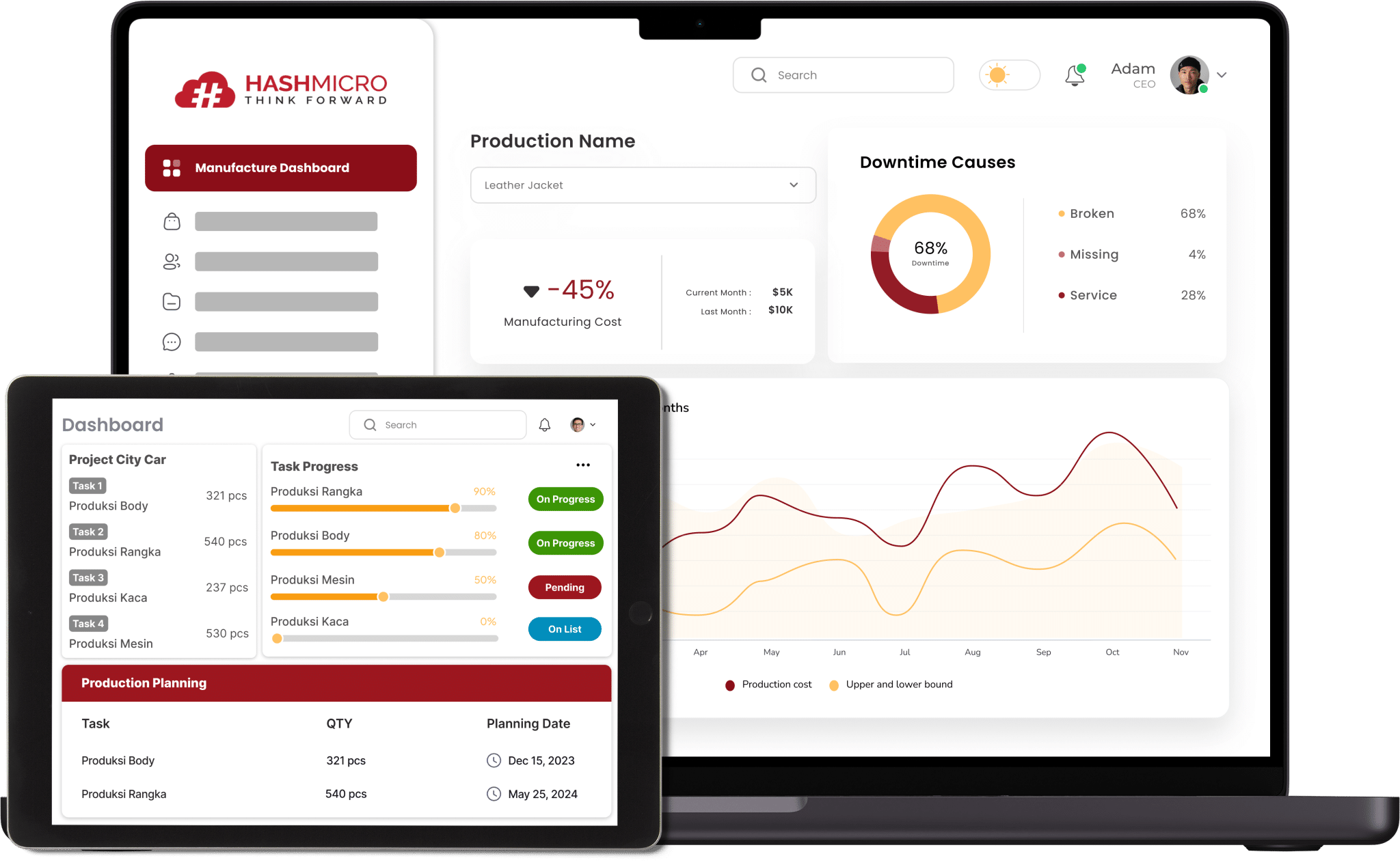To get an edge in today’s competitive economy, the company must understand how to enhance efficiency. Essentially, you must manufacture more, and a manufacturing execution system (MES) may assist you. According to Oxford Dictionary, manufacturing is the business or industry of producing goods in large quantities in factories.
A manufacturing execution system, in technical terms, is a system that links and monitors equipment and work centers on the factory floor. In addition, an MES’s primary purpose is to assure the effective implementation of manufacturing processes and increase production efficiency. This article will discover what MES is, how it differs from ERP, and its aims.

Table of Content:
Table of Content
Table Of Content
- What is MES?
- MES Implementation of Strategic Business
- Benefits of a Manufacturing Execution System
- MES and ERP Integrations
- MES Functionality
- MES for Business
- MES Software Solutions and Providers
- Conclusion
What is MES?

A manufacturing execution system (MES) is a software solution that can link, unify, and regulate production processes proactively and methodically to assure quality and efficiency. The goal of MES is to track and gather accurate real-time data regarding the whole manufacturing life cycle. It may also connect numerous factories, sites, and vendor-direct production data and readily interact with corporate business equipment, controllers, and applications. Furthermore, MES collects data on product provenance, performance, traceability, materials management, work in progress (WIP), and other plant operations. This information, in turn, allows decision-makers to better understand existing factory floor settings and enhance production processes.
Related articles: What is in the Manufacturing Process?
MES Implementation of Strategic Business
Manufacturers must have well-defined strategic business objectives. This involves making educated judgments quickly in an operational environment that is constantly changing. Many changes are occurring in manufacturing as innovation accelerates. Furthermore, producers must enhance unpredictability and stress the operations to maintain a high level of quality.
Manufacturing Execution Systems (MES) can help you monitor and synchronize production across plants for worldwide distribution. It will also assist in real-time communication with the firm. In the corporate world, MES aids in the elimination of human error in production by providing real-time quality data checks, outcomes monitoring, and automated specification and business rule enforcement. This will help the organization produce higher-quality products and processes while increasing efficiency.
Production Execution Systems will also help companies track product and order data on the factory floor, collect transactions for reporting to finance and planning systems and communicate orders and manufacturing instructions to shop floor staff electronically. With the various practicalities it provides, MES will greatly aid businesses in establishing an effective business strategy.
Benefits of a Manufacturing Execution System

Manufacturing Execution Systems (MES) can offer a variety of short- and long-term advantages, including:
- Improved production efficiency: MES can optimize production schedules, improve inventory management, and reduce cycle times, leading to increased productivity and reduced waste.
- Enhanced quality control: The system can assist in guaranteeing that the products are produced in compliance with the necessary specifications and quality standards. It also provides real-time monitoring of production processes, allowing for immediate corrective action in case of deviations.
- Better data management: MES can provide manufacturers with accurate, real-time data on production performance, which can help them make informed decisions about resource allocation, process improvement, and product development.
- Increased flexibility: A manufacturing execution system can help manufacturers respond quickly to changes in demand or production requirements by adjusting schedules, inventory levels, and production processes.
- Regulatory compliance: MES can help manufacturers comply with industry regulations and standards, such as FDA regulations for pharmaceutical manufacturing, by providing accurate data tracking and documentation.
MES and ERP Systems Integrations
MES (Manufacturing Execution Systems) and ERP (Enterprise Resource Planning) systems are both critical components of modern manufacturing operations. Although they are distinct systems, their design facilitates collaboration to deliver a comprehensive solution for managing and optimizing production operations.
MES are designed to manage and monitor the manufacturing process in real-time, providing visibility into shop floor operations, labor performance, and production status. The systems are typically focused on managing production orders, scheduling and tracking production processes, and enforcing quality control procedures.
ERP systems, on the other hand, combine all components of a business into a single information system. The data offered by ERP is also created in real-time, allowing production managers to make rapid and precise choices. For example, despite being in a different department, every company employee has access to the same data.
While MES and ERP systems have different functions, they are designed to work together to provide a comprehensive solution for managing production operations. MES systems provide real-time data on shop floor operations, which can be integrated with ERP systems to provide a unified view of business operations.
Both operate together to achieve a common goal inside your company. In short, ERP systems can tell you whether or not you need to increase your manufacturing output, and MES can show you how. Therefore, businesses must choose the best manufacturing software to suit their business needs and requirements.
MES Functionality
The manufacturing standard execution system requires 11 fundamental operations, according to the MESA-11 model. Since its initial publication, MESA has improved the model to incorporate enterprise-level initiatives, business operations, plant operations, and real production. However, we will focus on the original 11 basic tasks, which modern MES systems still include, and how companies have used them to increase production efficiency.
Management of operations
Provide your staff with a comprehensive picture of their anticipated production orders and production routes. As a result, this guarantees that everyone on your team is on the same page and eliminates errors caused by misunderstanding.
Dispatching production units
Manage the two-way production data flow between the ERP and the workshop in real-time. This guarantees that production data is always consistent, correct, and up to date.
Tracking of products and genealogy
Parts or completed batches should be grouped with all relevant production data, from raw materials to component assembly. Additionally, this information is precious for firms that adhere to government or industry rules.
Labor management
Easily manage your people, products, and/or operations and track any skills or authorizations they need. Moreover, this ensures that you always have the right people in every production process.
Quality management
Manage the quality of your manufacturing processes and units—including quality deviations and exceptions. This function can be integrated directly into the MES software or can use external software.
Management of maintenance
Preventive machine maintenance may be planned more quickly and precisely to decrease downtime and production interruptions.
Data collection and acquisition
Track and collect important data, then easily restore it when you need it. Manufacturing execution systems (MES) can store all production data from time to time so that when the company needs an audit, the data is there and not mixed with other data.
Process management
Provides complete process flow and operational sequencing, as well as comprehensive production traceability. By using manufacturing software, companies can simplify production processes so that results increase. In addition, the use of a manufacturing execution system can also reduce production costs so that the company’s purchasing budget can be reduced.
Analyzed performance
Calculate key performance indicators (KPIs) like rework, scrap, process capacity, OEE, and more by combining data. Moreover, this information will help you understand how well your manufacturing process is performing and how it may be improved.
Document management
Provide your operators with an easy method to access critical documents, including instructions, drawings, notes, and more, whenever they need them. This saves you and your staff time by eliminating the need to rummage.
Allocation of resources and current state
The use of manufacturing software can make it easier for managers to monitor production and human resources. Companies can see how employees are performing, production processes, and distribution of production materials in one complete platform.
MES for Business

A comprehensive Manufacturing Execution Software (MES) model can handle many manufacturing sectors and processes, including highly complicated process workflows, high-volume automated data collecting, make-to-order, discrete assembly, batch processing, rolled goods, and more.
Various discrete, batch, and continuous process manufacturing sectors, such as semiconductors, electronics, medical devices, automotive, aerospace, pharmaceuticals, metals, and plastics, utilize manufacturing execution software (MES). Built a flexible Manufacturing Execution System with an open SOA architecture for ease of connection with enterprise applications and shop floor automation. The system adapts to the customers’ business without bespoke programming.
Increased productivity, more significant data collection, real-time visibility, and an optimized staff are just a few of the advantages of MES for a firm. Manufacturing execution systems, on the other hand, are not for everyone. In fact, smaller companies may discover that their manufacturing processes aren’t substantial enough to justify extra software solutions like manufacturing execution systems. They may also believe that their profit margins are too low for this investment. As with any technology, you should consider your alternatives and determine whether MES is a good fit for your manufacturing organization.
MES Software Solutions and Providers
You must select the finest MES for your manufacturing firm by considering all available options, including functionality, pricing, and deployment. Hence, we examined MES, which made our top five options, to assist you in making your decision.
HashMicro ERP
HashMicro’s Manufacturing Execution System (MES) is a robust and advanced solution designed to optimize manufacturing operations. This comprehensive system offers a range of benefits tailored to enhance efficiency, reduce costs, and improve production processes. Here’s a detailed look at each of the key benefits:
- Unlimited User Access: The MES from HashMicro stands out with its unlimited user access feature. This allows an unrestricted number of users to access the system, enabling seamless collaboration and communication across all departments. This feature is particularly beneficial for growing businesses as it supports scalability without additional costs or restrictions on user numbers.
- IoT Integration: Integrating with the Internet of Things (IoT) is another significant advantage. This integration enables real-time data collection and analysis from various IoT devices and sensors used in the manufacturing process. This connectivity allows for more accurate monitoring and control of production lines, leading to increased efficiency, predictive maintenance, and reduced downtime.
- Cloud-Based Software: Being cloud-based, HashMicro’s MES offers flexibility and accessibility. It allows users to access the system from anywhere, using any device with an internet connection. This enhances collaboration and provides real-time updates and monitoring of manufacturing processes. Additionally, cloud-based systems reduce the need for extensive on-site IT infrastructure, leading to cost savings and increased data security.
- Discussion and Customization: HashMicro emphasizes the importance of customization in their MES. They offer detailed discussions with clients to understand specific needs and tailor the system accordingly. This bespoke approach ensures that the MES aligns perfectly with the unique processes and requirements of each manufacturing facility, thereby enhancing efficiency and productivity.
- Free Demo Service: Prospective clients can benefit from HashMicro’s free demo service. This allows them to experience the system firsthand, understand its features and capabilities, and see how it can be integrated into their existing processes. The demo service is an excellent way for companies to make an informed decision about whether HashMicro’s MES is the right fit for their needs.
In summary, HashMicro’s Manufacturing Execution System offers a comprehensive, customizable, and scalable solution for manufacturing companies. Its unlimited user access, IoT integration, cloud-based nature, customization capabilities, and free demo service make it a top contender in the realm of MES solutions.
Datacor ERP
Customer relationship management (CRM), manufacturing resource planning (MRP), product life cycle management, supply chain management, and business intelligence are all part of Datacor ERP, an integrated and comprehensive suite of applications. It’s available both on-premises and in the cloud. Chemical process producers and distributors of all sizes can benefit from Datacor ERP.
EnterpriseIQ manufacturing ERP
EnterpriseIQ Manufacturing ERP, the flagship solution of the IQMS software provider, has integrated ERP and MES applications that include accounting, CRM, reporting, business intelligence, supply chain, planning and scheduling, and warehousing and shipping management. Furthermore, discrete and batch producers of various sizes across several sectors, including aerospace, medical devices, automotive, food and beverage, consumer products, plastics, packaging, and others, should use this kind.
E2 shop system
The E2 Shop System is a manufacturing software package that includes scheduling, purchasing, shipping, customer administration, and accounting. Additionally, workshops, contract manufacturers, and make-to-order manufacturers are good candidates for the E2 Shop System.
Infor Visual ERP
Basically, MES, MRP, supply chain management, HR, reporting, and CRM are all included in the Infor optical ERP system. The low learning curve, easy interface, and coherent components of Infor visual ERP are popular among users.
Prodsmart
Prodsmart is a cloud-based production tracking and management solution that includes MES, MRP, and planning. It is helpful for companies in the manufacturing and fabrication sectors, such as metals, medical devices, footwear, automotive, chemical, electronics, and food processing.
Conclusion
To sum up, this explains why MES is essential for your business. This will make it easy to consider its use in your industry. With a complete production system in South East Asia, you can increase the efficiency and profitability of your manufacturing firm. And finally, get full control of every production process with Hash Manufacturing Automation and get free demo now!























































